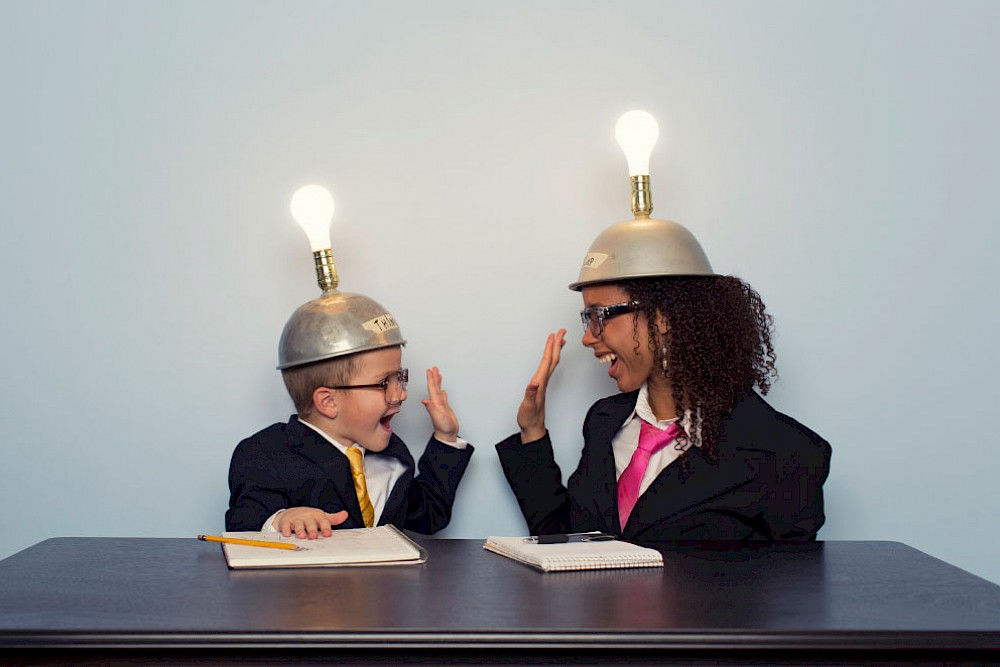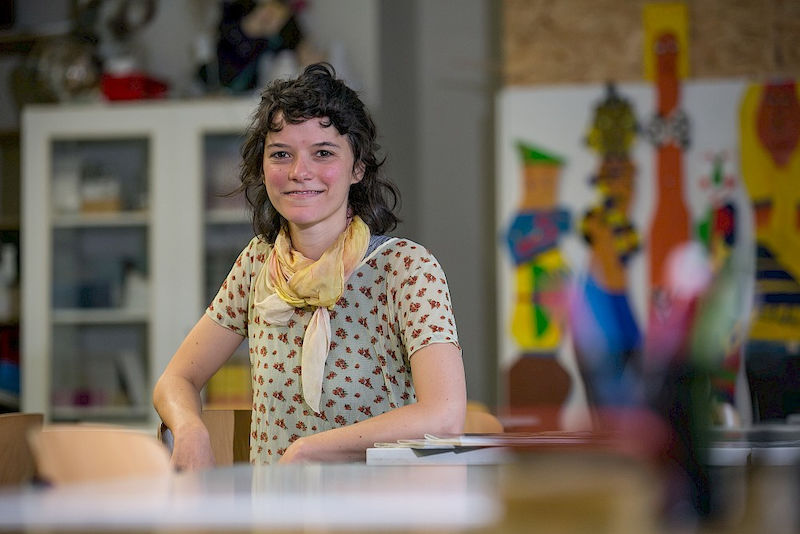Better prepared for school.

One future teacher who is already benefiting from the project results is Nora Haser. She has completed a teaching internship at the inclusive comprehensive school Integrierte Gesamtschule Halle (IGS Halle): "Admittedly, I was a little bit excited before going into the classroom. I taught a double period of German and had prepared for it for three days." The classes she taught included students with varying learning dispositions, including special needs children. "I was quite excited beforehand when it came to finding out how flexible I can plan my lessons, and whether I would need to prepare numerous sets of alternative exercises beforehand," says Nora Haser, who is studying to become a highest secondary school level German and Arts teacher at the University of Halle, where she is in her ninth semester. Classes are not always made up of children and youths with varying learning dispositions, even though the education system should be inclusive and open to all people, according to the 2008 UN Convention on the Rights of Persons with Disabilities. However, integrating inclusion into the everyday routines at school and the existing system is a challenge that calls for many resources and reforms. "In Germany, the kind of school a child goes to often still depends very much on their performance and social background, unfortunately. You will rarely see a special needs child in a 'Gymnasium', the most demanding of the three types of higher secondary school, for example," says Susanne Schütz from the University of Halle's Teacher-Training Centre. She coordinates the KALEI project.
Future teachers will at some point be faced with the challenge of inclusive teaching. Until now, this aspect has rarely been addressed in their training. However, inclusion means more than just giving consideration to children with disabilities. "We should say goodbye to the idea that inclusion focuses only on deficits. It is rather about taking the different learning dispositions and the social and cultural differences between people into account," says Susanne Schütz. One of KALEI's aims is therefore to prepare students who are studying to become teachers for inclusive teaching in order to raise their awareness of the varying needs of the children and youths they will teach.
Work based on practical examples
The project is funded within the scope of the teacher training quality initiative (‘Qualitätsoffensive Lehrerbildung’) established by the German national and regional governments at the 2013 Joint Science Conference. "The fact that the Germany's national and regional governments are tackling the issue of teacher training jointly and have started this initiative sends out an important signal," explains Professor Thomas Bremer, the director of the Teacher-Training Centre, because although each individual federal state in Germany is responsible for its own education system, the national as well as the regional governments have agreed to contribute up to 500 million euros to the initiative over the next few years. Since 2016, KALEI has received around two million euros of this for four years. One aim of the teacher training quality initiative is to get the future teachers into the classroom sooner, because depending on the university they attend and the federal state it is in, trainee teachers often gain school experience quite late in their course, sometimes not until they are completing the final, practical part of their training.
However, that's not the case at the University of Halle. Instead of long periods of uninterrupted practical training or an entire semester in school, there are several shorter practical classroom experience phases, a concept that is much appreciated by trainee teacher Nora Haser: "I was at the University of Stuttgart before coming here. The practical training there lasted a whole nine weeks. I prefer the shorter intervals at Halle because they give me the chance to reflect on my experiences and to learn from them."
As a result of KALEI, teacher training courses will now include more practical classroom experience. "We want to change the structure of the classroom experience periods and intend to ensure that trainee teachers can hone their skills with authentic and specific cases," says Susanne Schütz. At university, they are taught methodological approaches and the didactics; however, what is important is putting the theory into practice and reflecting on it. After all, one core issue the project focuses on is to increase the case-based training contents. Case-based means that the trainee teachers have to deal with as many real-life cases as possible in order to learn from them. This is achieved, for example, through practical exercises in school where they initially observe lessons in small groups and then go on to teach a few periods. "I found it really helpful that all of us took turns and we observed each other. This reduces the pressure, and you practice in a safe setting," Nora Haser says about her experiences.
This case-based approach benefits the trainee teachers in two ways: "On the one hand, they already learn to discuss teaching during their training without the pressure they would be under in a practical application environment. And on the other, they can try out the response options available to them in these situations on their own cases and those of the others," explains the project coordinator Schütz. In future, there will also be an electronic case archive for this purpose. Authentic cases will be collected in a database which can then be used for research and teaching.
Change of perspective and thought-provoking impulses
A further challenge future teachers are facing is taking the different languages and cultural diversity into account when teaching. So far, university-led teacher training courses have hardly addressed these aspects. That is why KALEI is promoting the internationalisation of teaching and intercultural experiences for trainee teachers, for example through an international exchange programme. There is also the additional subject of "German as a second language", which includes modules on interculturality, migration and integration. Haser already spent some time abroad before taking up her studies. "After I graduated from school, I did an internship in a kindergarten attached to an all-day school abroad. I was interested in working with people and enjoyed it so much that it prompted my decision to become a teacher."
By now, she has already completed nine semesters which included the opportunity to gain some first practical classroom experience as a teacher. However, the situation at IGS Halle was still an unusual one for her, as she had previously addressed the issue of teaching special needs children in theory only. "I basically assumed that I would have to adapt the educational material to meet the needs of each child. Luckily, it's not quite so personalised after all. Dyslexic children, for example, are given different exercise sheets or are allowed to use a tablet for writing," she says, and goes on to report that there are offers in the afternoon, for example, to give extra support to children with special needs. The basic seminar on the fundamentals of inclusive education offered within the scope of KALEI raised her awareness of the issue beforehand. It was developed within the scope of the profile module on inclusion and has been mandatory for trainee teachers since the 2016/17 winter semester.
The basic seminar and the profile seminars that are based on it are not aimed at convincing the trainees to develop a particular opinion towards inclusion. "In fact, we want to encourage them to develop their own attitude towards it. We are providing them with scientific arguments and encourage reflection," emphasises Susanne Schütz. The various perspectives of inclusion and heterogeneity are supported by two aspects: On the one hand, trainees from the various teacher subjects, i.e. biology, art, language course, visit the seminars and on the other, the different professional backgrounds of the lecturers also contribute, the profile seminars pursue varying social pedagogy, school education or pedagogical special needs support approaches.
Is the concept working?
The discussions during the seminar made Nora Haser think: "I had hardly thought about the issue of inclusion before." She also felt that the different methods suggested in the course of the seminar which she will later be able to try out in the classroom were particularly useful. Whether other trainee teachers feel the same way is also another project research question, as the development and availability of offers is only one side of the coin; they must also be evaluated in terms of whether and how they work and be optimised. Assistant Professor Dr Doris Wittek is responsible for the scientific evaluation of KALEI. "We investigate, for example, to what extent KALEI participants become more aware of the heterogeneity of the students," Wittek says. She and her team use online questionnaires for this purpose and conduct qualitative surveys with selected trainees.
Another research aspect is the question of how teachers develop their teaching disposition. "So for example, do future teachers see themselves as historians who teach, or history teachers?" says Susanne Schütz. Which aspect dominates: Their chosen subject, or the desire to teach? Which of these leads to more productive teaching? And how does this perception change as their career progresses? The project coordinator within the scope of KALEI is above all interested in one thing: "We want to link the various university-led teacher training areas more closely with each other and offer opportunities for mutual exchange."
contact: Susanne Schütz
project coordinator KALEI
phone: +49 345 55-21719
e-mail: susanne.schuetz@zlb.uni-halle.de

